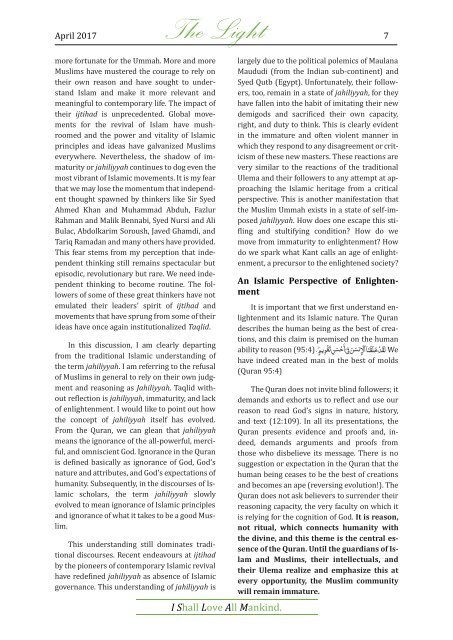2017 04 The Light April 2017
monthly Journal of the Ahmadiyya Association for the Propagation of Islam. Presenting Islam as a tolerant, liberal and peaceful religion as practiced by the Holy Prophet Muhammad (s).
monthly Journal of the Ahmadiyya Association for the Propagation of Islam. Presenting Islam as a tolerant, liberal and peaceful religion as practiced by the Holy Prophet Muhammad (s).
Create successful ePaper yourself
Turn your PDF publications into a flip-book with our unique Google optimized e-Paper software.
<strong>April</strong> <strong>2017</strong> <strong>The</strong><br />
<strong>Light</strong> 7<br />
more fortunate for the Ummah. More and more<br />
Muslims have mustered the courage to rely on<br />
their own reason and have sought to understand<br />
Islam and make it more relevant and<br />
meaningful to contemporary life. <strong>The</strong> impact of<br />
their ijtihad is unprecedented. Global movements<br />
for the revival of Islam have mushroomed<br />
and the power and vitality of Islamic<br />
principles and ideas have galvanized Muslims<br />
everywhere. Nevertheless, the shadow of immaturity<br />
or jahiliyyah continues to dog even the<br />
most vibrant of Islamic movements. It is my fear<br />
that we may lose the momentum that independent<br />
thought spawned by thinkers like Sir Syed<br />
Ahmed Khan and Muhammad Abduh, Fazlur<br />
Rahman and Malik Bennabi, Syed Nursi and Ali<br />
Bulac, Abdolkarim Soroush, Javed Ghamdi, and<br />
Tariq Ramadan and many others have provided.<br />
This fear stems from my perception that independent<br />
thinking still remains spectacular but<br />
episodic, revolutionary but rare. We need independent<br />
thinking to become routine. <strong>The</strong> followers<br />
of some of these great thinkers have not<br />
emulated their leaders’ spirit of ijtihad and<br />
movements that have sprung from some of their<br />
ideas have once again institutionalized Taqlid.<br />
In this discussion, I am clearly departing<br />
from the traditional Islamic understanding of<br />
the term jahiliyyah. I am referring to the refusal<br />
of Muslims in general to rely on their own judgment<br />
and reasoning as Jahiliyyah. Taqlid without<br />
reflection is jahiliyyah, immaturity, and lack<br />
of enlightenment. I would like to point out how<br />
the concept of jahiliyyah itself has evolved.<br />
From the Quran, we can glean that jahiliyyah<br />
means the ignorance of the all-powerful, merciful,<br />
and omniscient God. Ignorance in the Quran<br />
is defined basically as ignorance of God, God’s<br />
nature and attributes, and God’s expectations of<br />
humanity. Subsequently, in the discourses of Islamic<br />
scholars, the term jahiliyyah slowly<br />
evolved to mean ignorance of Islamic principles<br />
and ignorance of what it takes to be a good Muslim.<br />
This understanding still dominates traditional<br />
discourses. Recent endeavours at ijtihad<br />
by the pioneers of contemporary Islamic revival<br />
have redefined jahiliyyah as absence of Islamic<br />
governance. This understanding of jahiliyyah is<br />
I Shall Love All Mankind.<br />
largely due to the political polemics of Maulana<br />
Maududi (from the Indian sub-continent) and<br />
Syed Qutb (Egypt). Unfortunately, their followers,<br />
too, remain in a state of jahiliyyah, for they<br />
have fallen into the habit of imitating their new<br />
demigods and sacrificed their own capacity,<br />
right, and duty to think. This is clearly evident<br />
in the immature and often violent manner in<br />
which they respond to any disagreement or criticism<br />
of these new masters. <strong>The</strong>se reactions are<br />
very similar to the reactions of the traditional<br />
Ulema and their followers to any attempt at approaching<br />
the Islamic heritage from a critical<br />
perspective. This is another manifestation that<br />
the Muslim Ummah exists in a state of self-imposed<br />
jahiliyyah. How does one escape this stifling<br />
and stultifying condition? How do we<br />
move from immaturity to enlightenment? How<br />
do we spark what Kant calls an age of enlightenment,<br />
a precursor to the enlightened society?<br />
An Islamic Perspective of Enlightenment<br />
It is important that we first understand enlightenment<br />
and its Islamic nature. <strong>The</strong> Quran<br />
describes the human being as the best of creations,<br />
and this claim is premised on the human<br />
ability to reason (95:4).<br />
have indeed created man in the best of molds<br />
(Quran 95:4)<br />
ٓ أَحْسَنِ تَقْوِيم َّ<br />
We ل َقَدْ خَلَقْنَا ٱْلِْنسَنَ ِفِ<br />
<strong>The</strong> Quran does not invite blind followers; it<br />
demands and exhorts us to reflect and use our<br />
reason to read God’s signs in nature, history,<br />
and text (12:109). In all its presentations, the<br />
Quran presents evidence and proofs and, indeed,<br />
demands arguments and proofs from<br />
those who disbelieve its message. <strong>The</strong>re is no<br />
suggestion or expectation in the Quran that the<br />
human being ceases to be the best of creations<br />
and becomes an ape (reversing evolution!). <strong>The</strong><br />
Quran does not ask believers to surrender their<br />
reasoning capacity, the very faculty on which it<br />
is relying for the cognition of God. It is reason,<br />
not ritual, which connects humanity with<br />
the divine, and this theme is the central essence<br />
of the Quran. Until the guardians of Islam<br />
and Muslims, their intellectuals, and<br />
their Ulema realize and emphasize this at<br />
every opportunity, the Muslim community<br />
will remain immature.














